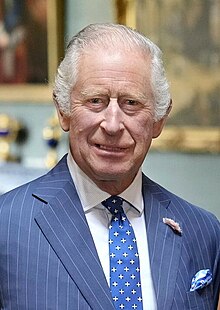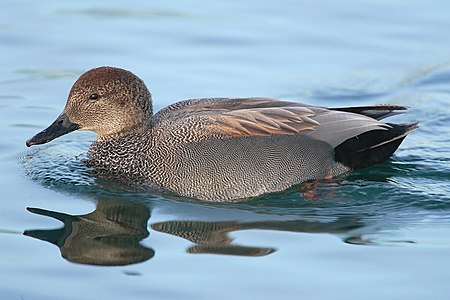Portal:Canada
| Showcase | Contents | Contributing |
Introduction
Canada is a country in North America. Its ten provinces and three territories extend from the Atlantic Ocean to the Pacific Ocean and northward into the Arctic Ocean, making it the world's second-largest country by total area, with the world's longest coastline. Its border with the United States is the world's longest international land border. The country is characterized by a wide range of both meteorologic and geological regions. It is a sparsely inhabited country of just over 41 million people, the majority residing south of the 49th parallel in urban areas. Canada's capital is Ottawa and its three largest metropolitan areas are Toronto, Montreal, and Vancouver.
Canada is a parliamentary democracy and a constitutional monarchy in the Westminster tradition. The country's head of government is the prime minister, who holds office by virtue of their ability to command the confidence of the elected House of Commons and is appointed by the governor general, representing the monarch of Canada, the ceremonial head of state. The country is a Commonwealth realm and is officially bilingual (English and French) in the federal jurisdiction. It is very highly ranked in international measurements of government transparency, quality of life, economic competitiveness, innovation, education and gender equality. It is one of the world's most ethnically diverse and multicultural nations, the product of large-scale immigration. Canada's long and complex relationship with the United States has had a significant impact on its history, economy, and culture.
A developed country, Canada has a high nominal per capita income globally and its advanced economy ranks among the largest in the world, relying chiefly upon its abundant natural resources and well-developed international trade networks. Recognized as a middle power, Canada's strong support for multilateralism and internationalism has been closely related to its foreign relations policies of peacekeeping and aid for developing countries. Canada is part of multiple international organizations and forums. (Full article...)
Featured article -
The 2nd Canadian Regiment (1776–1783), also known as Congress's Own or Hazen's Regiment, was authorized on January 20, 1776, as an Extra Continental regiment and raised in the province of Quebec for service with the American Continental Army under the command of Colonel Moses Hazen. All or part of the regiment saw action at Staten Island, Brandywine, Germantown and the Siege of Yorktown. Most of its non-combat time was spent in and around New York City as part of the forces monitoring the British forces occupying that city. The regiment was disbanded on November 15, 1783, at West Point, New York. (Full article...)
Featured biography -
Joseph Jacques Omer Plante (French pronunciation: [ʒɑk plɑ̃t]; January 17, 1929 – February 27, 1986) was a Canadian professional ice hockey goaltender. During a career lasting from 1947 to 1975, he was considered to be one of the most important innovators in hockey. He played for the Montreal Canadiens from 1953 to 1963; during his tenure, the team won the Stanley Cup six times, including five consecutive wins. In 2017 Plante was named one of the "100 Greatest NHL Players" in history. (Full article...)
Selected panorama -
National symbol -
Parliament Hill (French: Colline du Parlement), colloquially known as The Hill, is an area of Crown land on the southern bank of the Ottawa River that houses the Parliament of Canada in downtown Ottawa, Ontario, Canada. It accommodates a suite of Gothic revival buildings whose architectural elements were chosen to evoke the history of parliamentary democracy. Parliament Hill attracts approximately three million visitors each year. The Parliamentary Protective Service is responsible for law enforcement on Parliament Hill and in the parliamentary precinct, while the National Capital Commission is responsible for maintaining the nine-hectare (22-acre) area of the grounds. (Full article...)
Selected vital article -

The monarchy of Canada is Canada's form of government embodied by the Canadian sovereign and head of state. It is one of the key components of Canadian sovereignty and sits at the core of Canada's constitutional federal structure and Westminster-style parliamentary democracy. The monarchy is the foundation of the executive (King-in-Council), legislative (King-in-Parliament), and judicial (King-on-the-Bench) branches of both federal and provincial jurisdictions. The current monarch is King Charles III, who has reigned since 8 September 2022. (Full article...)
Selected picture -
Current events
- October 15, 2024 –
- The Palestinian Prisoner Solidarity Network is designated as a terrorist group by the Canadian government and is sanctioned by the U.S. government, due to the group's alleged ties to the Popular Front for the Liberation of Palestine. (CTV News)
- October 10, 2024 – Russian invasion of Ukraine
- The World Bank approves a new financial intermediary fund consisting of grants from the United States, Japan, Canada, and other countries coupled with interest from frozen Russian assets to give to Ukraine as part of a $50 billion loan. (Reuters)
- October 4, 2024 –
- At least two people are killed and three others are injured, including one critically, in a suspected arson at a 100-year-old three-story building in the Old Montreal neighbourhood of Montreal, Quebec, Canada. (CBC News) (CFCF-TV)
- A woman from Toronto, Ontario, Canada, is arrested and charged with murder following a stabbing spree that killed three people in Toronto, Niagara Falls and Hamilton between Tuesday and Thursday. (CFTO-TV)
- September 25, 2024 –
- Canadian Prime Minister Justin Trudeau survives a no-confidence vote by a vote of 211–119. (BBC News)
- September 24, 2024 –
- Scientists from the University of Waterloo announce that they have positively identified bones found on King William Island in Nunavut, Canada, as those of James Fitzjames, captain of HMS Erebus during Franklin's lost expedition. (CBC News)
Did you know -

- ... that Chickaboom!, by country musician Tami Neilson, was nominated for both Canadian and New Zealand music awards?
- ... that Canadian peacekeepers participated in every UN peacekeeping effort from its inception until 1989?
- ... that in 2019, the Canadian government's Translation Bureau began providing translation services in Dene, East Cree, Plains Cree, and Mohawk?
- ... that Zebedee Nungak, taken as a child for an experiment by the Canadian government, went on to "cross antlers with prime ministers, premiers and Québec separatists"?
- ... that a year after becoming the first woman president of the Canadian Political Science Association, Caroline Andrew moderated the first Canadian leaders' debate on women's issues?
- ... that Mount Churchill, a volcano in Alaska, distributed ash as far as Europe and may have driven migration from Canada to southwestern North America?
- ... that the Aubinadong River in Ontario, Canada, was an indigenous canoe route and is still used for canoe camping as its main recreational activity?
Featured list -
The 400-series highways are a network of controlled-access highways in the Canadian province of Ontario, forming a special subset of the provincial highway system. They are analogous to the Interstate Highway System in the United States or the Autoroute system of neighbouring Quebec, and are regulated by the Ministry of Transportation of Ontario (MTO). The 400-series designations were introduced in 1952, although Ontario had been constructing divided highways for two decades prior. Initially, only Highways 400, 401 and 402 were numbered; other designations followed in the subsequent decades. To this day, not all controlled-access highways in Ontario are a part of the 400-series highway network. The network is situated almost entirely in Southern Ontario, although Highway 400 extends into the more remote northern portion of the province. (Full article...)
Main articles
Associated Wikimedia
The following Wikimedia Foundation sister projects provide more on this subject:
-
Commons
Free media repository -
Wikibooks
Free textbooks and manuals -
Wikidata
Free knowledge base -
Wikinews
Free-content news -
Wikiquote
Collection of quotations -
Wikisource
Free-content library -
Wikiversity
Free learning tools -
Wikivoyage
Free travel guide -
Wiktionary
Dictionary and thesaurus
































